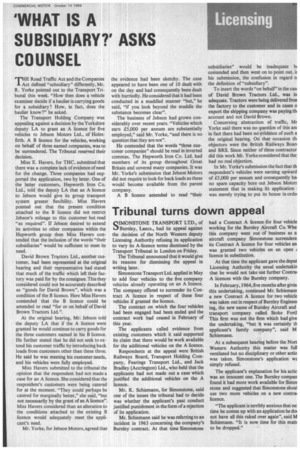'WHAT IS A
Page 47

If you've noticed an error in this article please click here to report it so we can fix it.
SUBSIDIARY?' ASKS•
COUNSEL
riliE Road Traffic Act and the Companies ct defined "subsidiary" differently, Mr.
R. Yorke pointed out to the Transport Tribunal this week. "How then does a vehicle examiner decide if a haulier is carrying goods for a subsidiary? How, in fact, does the haulier know?" he asked.
The Transport Holding Company was appealing against a decision by the Yorkshire deputy LA to grant an A licence for five vehicles to Jebson Motors Ltd., of Holmfirth. A B licence for the vehicles, working on behalf of three named companies, was to be surrendered. The Tribunal reserved their decision.
Miss E. Havers, for THC, submitted that there was a complete lack of evidence of need for the change. Three companies had supported the application, two by letter. One of the latter customers, Hepworth Iron Co. Ltd., told the deputy LA that an A licence to Jebson would give its group transport system greater Flexibility. Miss Havers pointed out that the present condition attached to the B licence did not restrict Jebson's mileage to this customer but read "as required". If Jebson desired to extend its activities to other companies within the Hepworth group then Miss Havers contended that the inclusion of the words "their subsidiaries" would be sufficient to meet its need.
David Brown Tractors Ltd., another customer, had been represented at the original hearing and their representative had stated that much of the traffic which left their factory was paid for by the consignee. This they considered could not be accurately described as "goods for David Brown", which was a condition of the B licence. Here Miss Havers contended that the B licence could be amended to read "for or on behalf of David Brown Tractors Ltd.".
At the original hearing, Mr. Jebson told the deputy LA that if the A licence were granted he would continue to carry goods for the three customers named in his B licence. He further stated that he did not seek to extend his customer traffic by introducing back loads from customers other than these three. He said he was meeting his customer needs, and his vehicles were fully employed.
Miss Havers submitted to the tribunal the opinion that the respondent had not made a case for an A licence. She considered that the respondent's customers were being catered for at the moment. "They could perhaps be catered for marginally better," she said, "but not necessarily by the grant of an A licence". Miss Havers considered than an alteration to the conditions attached to the existing B licence would adequately meet the applicant's need.
Mr. Yorke, for Jebson Motors, agreed that the evidence had been sketchy. The case appeared to have been one of 10 dealt with on the day and had consequently been dealt with hurriedly. He considered that it had been conducted in a muddled manner "but," he said, "if you look beyond the muddle the substance becomes clear".
The business of Jebson had grown considerably over recent years. "Vehicles which earn £5,000 per annum are substantially employed," said Mr. Yorke, "and there is no question that they are not".
He contended that the words "three customer companies" should be read in inverted commas. The Hepworth Iron Co. Ltd. had members of its group throughout Great Britain and covered many companies. It was Mr. Yorke's submission that Jebson Motors did not require to look for back loads as these would become available from the parent company.
A B licence amended to read "their subsidiaries" would be inadequate la contended and then went on to point out, it his submission, the confusion in regard u the definition of "subsidiary".
To insert the words "on behalf" in the casi of David Brown Tractors Ltd., was in adequate. Tractors were being delivered fron the factory to the customer and in cases o export the shipping company was paying till account and not David Brown.
Concerning abstraction of traffic, Mr Yorke said there was no question of this am in fact there had been no evidence of such a the original hearing. On that occasion fill objectors were the British Railways Boan and BRS. Since neither of these contractor did this work Mr. Yorke considered that the: had no real objection.
In Mr. Yorke's submission the fact that th respondent's vehicles were earning upward of £5,000 per annum and consequently hai no spare capacity bore out Jebson Motor: statement that in making its application was merely trying to put its house in ordei
































































































































